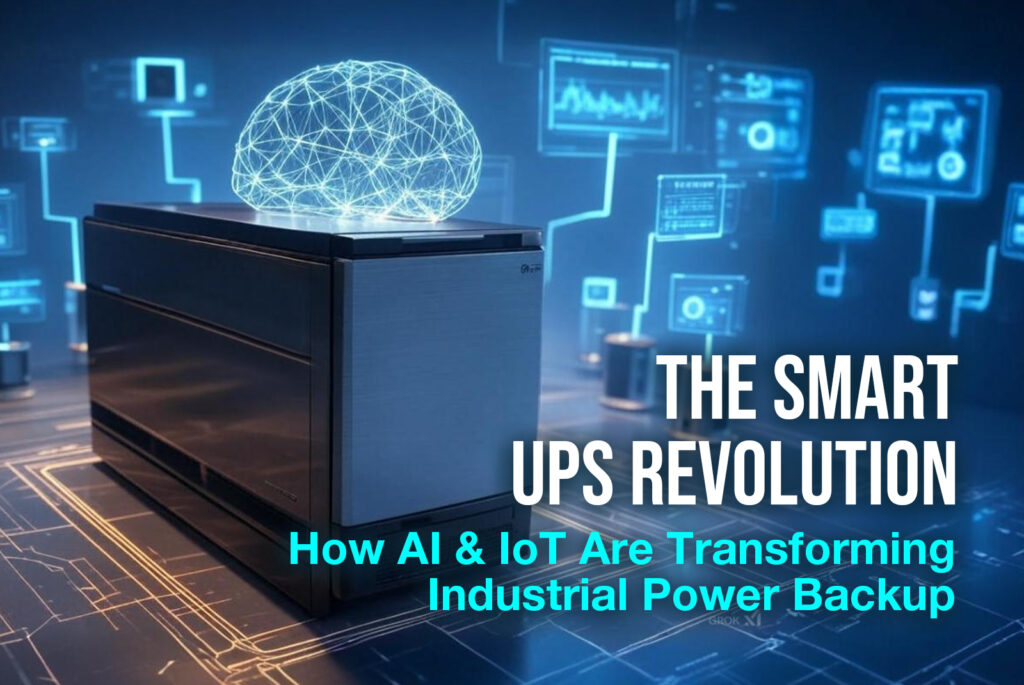Introduction
In today’s industrial landscape, ensuring uninterrupted power is not just an operational necessity—it is a strategic imperative. Industries such as semiconductor manufacturing, oil and gas, data centers, healthcare, and heavy manufacturing rely on mission-critical power infrastructure to maintain seamless operations. As businesses integrate automation, AI-driven manufacturing, and IoT-powered industrial systems, the demand for more resilient and intelligent Uninterruptible Power Supply (UPS) solutions has increased significantly.
Traditional UPS systems, while effective, are often inadequate in addressing modern industrial challenges. The need for predictive maintenance, real-time performance monitoring, and optimized energy efficiency has led to the rise of AI-powered Smart UPS solutions. Leveraging IoT, machine learning, and cloud analytics, these next-generation systems are redefining industrial power reliability, enabling businesses to minimize downtime, optimize power consumption, and enhance overall efficiency.
The Digital Shift Driving Smarter Power Backup
Industries worldwide are undergoing rapid digital transformation, driven by several key factors:
- Industry 4.0 and Automation – AI-driven manufacturing requires highly reliable power infrastructure.
- Edge Computing and IoT Adoption – The proliferation of connected devices has led to increased power demands.
- Sustainability and Energy Efficiency Goals – Companies are seeking greener and more cost-effective solutions.
- Unstable Grid Supply and Power Disruptions – Critical industries require robust backup strategies to mitigate risks.
As industrial operations become more complex, traditional UPS systems face limitations in predicting failures, managing dynamic loads, and optimizing energy usage. AI-powered Smart UPS solutions are addressing these challenges by offering greater reliability, efficiency, and adaptability.
How AI and IoT Are Transforming Industrial UPS Systems
1. Predictive Maintenance: Reducing Downtime with AI
Unexpected UPS failures can lead to significant downtime and financial losses. AI-driven UPS solutions use predictive analytics to monitor critical parameters in real time, such as:
- Battery health and expected lifespan
- Voltage fluctuations and load balancing
- Environmental conditions affecting performance
By leveraging machine learning, Smart UPS systems can detect early warning signs of failure and notify maintenance teams before a critical fault occurs. This approach reduces unplanned downtime, lowers maintenance costs, and extends the lifespan of power infrastructure.
2. IoT-Enabled Remote Monitoring and Control
Industrial UPS systems are often deployed in large-scale facilities and remote locations, making manual management inefficient. IoT-enabled Smart UPS solutions provide:
- Real-time power monitoring through cloud-based dashboards
- Remote troubleshooting and firmware updates to reduce manual interventions
- Automated fault detection and self-healing mechanisms for faster response times
These capabilities allow industrial operators to detect and resolve power issues proactively, improving uptime and overall reliability.
3. Intelligent Load Balancing and Adaptive Power Management
Unlike traditional UPS systems that provide fixed power backup, AI-powered solutions use adaptive load balancing to optimize energy distribution. These systems can:
- Analyze energy consumption patterns and adjust power delivery dynamically
- Prioritize mission-critical equipment during power disruptions
- Reduce energy wastage by optimizing power flow in real time
By making power infrastructure more intelligent and adaptive, Smart UPS solutions help industries achieve greater energy efficiency and cost savings.
4. AI-Driven Energy Optimization for Sustainability
As industries work toward carbon neutrality and net-zero emissions, energy efficiency has become a key priority. AI-powered UPS systems integrate with renewable energy sources such as solar and battery storage to:
- Optimize energy usage between the grid, batteries, and renewable sources
- Reduce reliance on diesel generators and other high-emission backup systems
- Ensure seamless transitions between power sources for uninterrupted operations
This approach helps industries lower their carbon footprint while maintaining consistent power availability.
The Future of Industrial UPS: Key Trends to Watch
The industrial UPS landscape is evolving rapidly, with several key trends shaping its future:
- Lithium-Ion Battery Adoption – Faster charging, longer lifespan, and higher energy density compared to lead-acid batteries.
- Edge AI Integration – On-site AI-powered decision-making for faster power optimization.
- Hybrid UPS Systems – Integration of UPS with solar, wind, and battery energy storage for sustainable power solutions.
- Cybersecurity-Enabled UPS – As power backup systems become more digital, protecting against cyber threats is critical.
Opportunities for UPS Providers and Industrial Operators
As industries transition to AI-powered Smart UPS solutions, significant opportunities emerge for UPS manufacturers, power infrastructure providers, and industrial operators.
For Industrial UPS Manufacturers:
- Develop AI-driven UPS systems with real-time predictive analytics to enhance reliability.
- Offer IoT-enabled, cloud-connected UPS solutions for remote monitoring and control.
- Design energy-efficient, lithium-ion-based UPS systems to support sustainability initiatives.
For Industrial Facility Operators:
- Upgrade legacy UPS systems to AI-powered Smart UPS solutions for improved uptime and efficiency.
- Integrate UPS with renewable energy sources to reduce dependence on traditional power grids.
- Implement predictive maintenance strategies to optimize costs and extend UPS lifespan.
Conclusion: AI-Powered UPS—The Future of Industrial Power Reliability
As industries worldwide embrace automation, AI-driven manufacturing, and energy-efficient operations, power backup solutions must evolve to meet these changing demands. AI and IoT-powered Smart UPS systems offer real-time monitoring, predictive analytics, adaptive load balancing, and seamless energy optimization, ensuring uninterrupted power for mission-critical industries.
For industrial businesses and infrastructure providers, transitioning to intelligent UPS solutions is not merely a technological upgrade—it is a strategic requirement. Investing in next-generation Smart UPS technology will be essential for ensuring resilient, efficient, and sustainable industrial power backup in the years to come.

